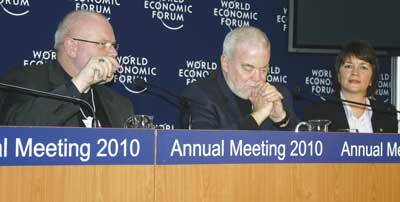Returning to Rome from Davos, Switzerland, and the 2010 World Economic Forum on Feb. 1, the secretary general of Caritas Internationalis, Lesley-Anne Knight, confessed to “mixed feelings” about the forum’s outcomes. The Davos event each year brings together international business, political, academic and social leaders to discuss the pressing economic and social problems of the capitalist world.
This year’s discussions were distracted by events in Haiti, but there was still plenty of time to review the structural challenges within the world’s economic system. “The World Economic Forum is good at responding to crises,” Knight wrote on the Caritas blog, “at identifying innovative solutions, at tackling new challenges—in the words of this year’s theme, at ‘rethinking, redesigning and rebuilding.’ But what concerns me is that the old, chronic problems of the world—like poverty, for instance—should not be neglected.”
Knight observed that at a forum she hosted on bringing values into global economics, “The discussions made clear that international institutions are underperforming on core objectives such as poverty eradication, sustainable economic growth, human security, conflict avoidance and many more.”
Knight described another session reviewing the United Nations Millennium Development Goals—an ambitious project meant to mitigate by half the worst effects of world poverty by 2015—that attracted a disappointingly small audience. Those who were present heard the Microsoft founder and philanthropist Bill Gates stress the need to keep up pressure on governments to honor their financial commitments toward achieving the goals and the economist Jeffrey Sachs charge that the lack of follow-through on millennium goals had nothing to do with the global recession but reflected a deep-seated lack of political will.
Knight brought Caritas Inter-nationalis’s unique perspective on development to the forum. “Finance has been focused on financial mechanisms, profits, and bonuses,” she said. “Human beings were left out, with dire consequences for us all, especially the poor. For humanitarian organizations, such as Caritas, the human person must be at the heart of everything we do. But this should equally be applied to economic systems, which are also ultimately at the service of humanity.”
At the forum Caritas advanced some basic principles: Financial institutions must consider the human impact of their activities, and poor nations should have an effective voice at international institutions. Caritas also called for aid recipients to play a greater role in their own development and for stronger recognition of civil society and faith groups in development planning.
At her “values” forum, Knight juggled the perspectives of delegates from the presumably divergent worlds of business and social justice. “As is often my experience,” she said, “when people from such different professional and cultural backgrounds come together in conversation, we find common values which unite us around shared objectives without difficulty...respect for the dignity of every human person, solidarity and concern for the common good and care for the most vulnerable in our society.”
But even after finding such reassuring common ground, Knight wonders, “Can our financial institutions now put these [ideals] into practice? Can they be motivated not solely by profit, but also genuinely serve the common good? Will development aid be targeted at meeting the needs of the poor rather than the national interests of donors? As Caritas people, as the sign and action of God’s love for all humanity, this must remain our hope.”








